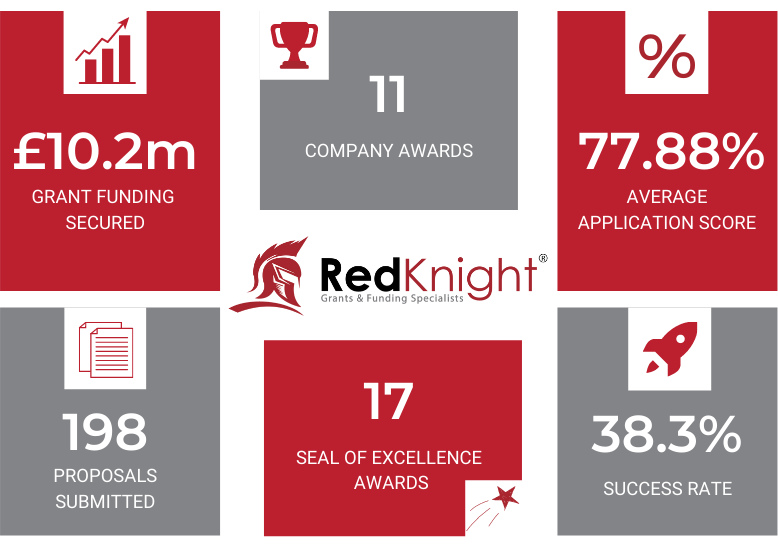Horizon Europe guarantee: application and grant offer statistics
On behalf of the Department for Business, Energy and Industrial Strategy (BEIS), UK Research and Innovation (UKRI) is delivering the statistic for 'Horizon Europe guarantee'.
This data is updated each month and includes the total number of:
- verified applications submitted to UKRI, and the total grant value requested in these applications
- grant offer letters issued to applicants, and the value of the grant offers issued.
The data is also divided according to the method used by UKRI to apply for the guarantee funds.
Number of applications and grant offers made through the Horizon Europe guarantee up to 28 February 2023.
| Guarantee grant type | Applications submitted and verified | Value of grants requested in verified applications | Grant offer letters issued | Value of grant offers issued |
| Collaborative Horizon Europe guarantee grants (hosted on Innovation Funding Service) | 1,387 | £614.0 million | 1,206 | £500.9 million |
| European Research Council guarantee grants | 211 | £304.4 million | 210 | £301.6 million |
| Marie Skłodowska-Curie Actions guarantee grants | 359 | £82.1 million | 347 | £80.3 million |
| Total | 1,957 | £1,000.5 million | 1,763 | £882.8 million
|
Apply for Horizon Europe guarantee funding
Although the UK is in the process of associating with the programme, the "Horizon Europe guarantee" scheme offers funds to academics and innovators who are unable to get their Horizon Europe grant. UKRI is distributing the cash through its grant mechanisms.
To be eligible you must:
- be based in the UK
- have been successful at applying for a Horizon Europe grant with final submission deadlines on or before 30 June 2023
- have been included on the initial grant proposal as a ‘beneficiary’ with an assigned budget
Before you submit your application for "multi-beneficiary funds," the coordinator and the European Commission must have signed your grant agreement.
For "mono-beneficiary grants," the Commission's financing offer must have been withdrawn, or you must send a letter saying that the "grant agreement preparation" process with the Commission has been terminated.
Follow the specific guidance for your type of grant here: UKRI guidance for the Horizon Europe guarantee scheme.
Source: UK Research and Innovation
DASA launches two new Innovation Focus Areas
In order to achieve strategic goals, the Defence Artificial Intelligence Centre (DAIC) will enhance the capability of the UK Ministry of Defence (MOD) to use artificial intelligence (AI) effectively. A new Innovation Focus Area (IFA), Artificial Intelligence for Defence, is being launched by Defence and Security Accelerator (DASA) and Defence AI Centre (DAIC). A purpose of this IFA is to invite proposals for innovative research projects aiming to implement AI within Defence and/or to overcome common barriers to implementing AI. This IFA seeks to use a variety of AI advances, including autonomous logistics, machine-speed decision-making, and human-machine teaming for military purposes, to significantly advance defence.
Applying AI to address defence challenges:
The UK's aim to adapt and utilise Artificial Intelligence (AI) at pace and scale for defence advantage is outlined in the Defence AI Strategy (DAIS). This IFA gives innovators the chance to recommend AI projects to defence in an effort to bring the best ideas from a diverse range of innovators. By using AI application to address defense challenges, the UK and its allies will be capable to maintain an advantage in defence and security. Defence is willing to utilize the efficiency gains that AI is delivering to a variety of other industries. Examples of intended outcomes from AI include changes in:
- the quality and timeliness of intelligence data available to military commanders
- the effectiveness in planning and conducting operations
- reducing the risk to life of armed forces personnel through the use of uncrewed, autonomous platforms
- automating routine tasks to free defence personnel up to do higher value activities
- achieving better value for the taxpayer by making the business of defence more efficient
DASA and DAIC are interested in funding proposals that bring significant benefits to defence through the use of AI.
- autonomous logistics and any research with the potential to significantly improve the efficiency of the logistics chain or increase availability
- exploiting operational data, e.g., to support intelligence analysis, or to protect the force. This could require using open-source data or classified data from any source, including sensors; if the exploitation of the innovation is likely to use classified data, your proposal would benefit from considering how this could be achieved (please note that no classified data will be provided)
- human-machine teaming for military effect (including the use of autonomous systems within the force, and the coordination of multiple crewed / autonomous systems)
- machine-speed decision making (e.g., to support operational planning and command and control)
- increasing efficiency, or how defence manages and supports its people and its systems
Read the full IFA and submit a proposal.
Source: Defence and Security Accelerator, www.gov.uk
Has the UK-Horizon Europe Association reached a breakthrough?
European Commission President Ursula von der Leyen says, the moment the Protocol agreement is approved, negotiations on the UK rejoining the science research programme can start.
In an effort to resolve the problems affecting post-Brexit trade and regulations in Northern Ireland, the president of the European Commission and Rishi Sunak have reached a "in principle" agreement to revise the protocol.
Additionally, Ms. von der Leyen claimed that approval of the Windsor Framework would make it possible for the UK to rejoin the €95.5 billion (£84.1 billion) Horizon programme. "This Windsor Framework is fantastic news for scientists and researchers in the European Union and in the UK," she told a press conference in Windsor.
Academics, lobbyists, and politicians are urging the two sides to complete affiliation as quickly as possible after 18 months of uncertainty as it appears that the main barrier to the UK joining Horizon Europe has been removed.
According to MEP Christian Ehler, a rapporteur for Horizon Europe in the European Parliament, the Windsor framework was a significant development in the relationship between the EU and the UK. “If a large majority in Westminster supports this agreement, the UK will once again be a trustworthy partner for the EU, and we must immediately complete the UK's association with Horizon Europe”, he said.
The UK government has consistently pledged that researchers and firms will get at least as much money from the EU initiative during the 2021–27 EU budget term if the UK is permanently excluded from Horizon Europe. In accordance with the TCA (Trade and Cooperation Agreement) , the UK would be permitted to take part in the Copernicus earth and space observation initiative in exchange for making an annual financing contribution of about €2 billion.
Sources: SCIENCE|BUSINESS, iNews, EURACTIV
EIC fund invests €331 million into European deep-tech companies
Since the last announcement in November 2022, the European Innovation Council Fund (EIC Fund) has invested a total of €331 million in 42 new deep-tech enterprises. Investment agreements have already been signed by 13 companies. A new type of computer vision software and robotics technologies for orthopaedic surgeons, visual search technologies for businesses and industry applications, breast self-reconstruction with patients' own tissue, innovative photonics, improved food production with reduced emissions, and a first miniaturised universal gas analyser for all renewable gases are among the pioneering start-ups that are poised to bring ground breaking innovations to citizens and businesses.
As the EIC Fund is now fully operational, this represents a tremendous advancement. The EIC Fund has made a total of 77 investments totalling over €521 million in deep-tech firms since the appointment of an external fund manager in September 2022. These investments have helped high-risk start-ups launch and expand their unique ideas in key European markets.
For start-ups and small businesses in Europe, the EIC Fund, the investment component of the EIC Accelerator, is a crucial source of capital. The EIC Accelerator grant financing of up to €2.5 million is supplemented by equity investments, which range from €500,000 to €15,000,000 per firm (higher in warranted circumstances). 269 out of the 378 chosen enterprises under Horizon Europe have so far signed their grant agreements. By signing grant agreements with chosen companies within 4-5 months, the EIC is now meeting the goal set by the EIC Board.
Switzerland expelled from coordination body for European research infrastructure
Switzerland is expelled from the European Strategy Forum on Research Infrastructures (ESFRI) since it is not associated with Horizon Europe, the European Union's (EU) research and innovation initiative. Under ESFRI rules, members must be EU states, associated to Horizon, or an EU candidate country to be the part of it.
Switzerland is deeply ingrained in the landscape of European research infrastructures. Additionally, it participates actively in associations like the European Molecular Biology Laboratory, the European Southern Observatory, and the European Space Agency. Switzerland hosts one of the world's largest scientific infrastructures, the European Organization for Nuclear Research (CERN), its exclusion is particularly problematic.
ESFRI, which was established in 2002, publishes roadmaps for research infrastructure in Europe to ensure that nations don't build identical facilities and that development complies with scientific goals. Swiss researchers participated in a number of ESFRI working groups for its most recent strategy in 2021. But the Swiss Academy of Sciences has announced that these experts would no longer be permitted to participate in these groups.
Researcher commissioner, Mariya Gabriel, said in a statement. “We are looking forward to renewing Switzerland's participation and re-engage at all levels as soon as possible, to allow for closer cooperation.” ESFRI is currently having “a general reflection on its cooperation with third countries,” she said. The outcome, which could include changes to the rules that exclude the Swiss, is expected this year. But any rule change to allow Switzerland back into ESFRI “also needs to take into consideration the exploratory talks on the future of our relationship,” Gabriel added, referring to the wider EU-Swiss negotiations.
Jana Kolar, ESFRI’s chair, acknowledged that research and innovation cooperation between the EU and Switzerland was part of “international relations” and so any return of Switzerland to ESFRI, even as an observer, “depends on the outcome of political decisions on the highest levels”.
If long-term affiliation is impossible, Switzerland is considering alternative measures that would begin in 2024 at the earliest.
DASA launches new programme to support defence innovation
The UK Government has launched a new £16 million fund to boost small and medium-sized enterprise (SME) defence innovation. The Defence Technology Exploitation Programme (DTEP) aims to bring SMEs and large suppliers together to solve defence problems.
What funding is available?
DTEP is delivered by the Defence and Security Accelerator in collaboration with Innovate UK. It offers companies grant funding of up to 50% of a project’s value to a maximum of £500,000 per grant.
Who can apply?
Applications are open to SMEs who are looking to deliver new innovations into the UK defence supply chain. They must:
- Be based in the UK and plan to deliver their project in the UK.
- Plan to partner with a UK-registered Higher Tier Supplier at the point of submission and for the duration of the project.
- Have a project that aligns with one of the Enduring Capability Challenges.
How to apply
The application process has five stages:
- Identify: Once you have a defence innovation project in mind, you should speak with your regional DASA Innovation Partner and identify a Higher Tier partner for your application.
- Review: You should then complete an outline submission. This will be reviewed by an Industry Project Review Panel, and you will receive feedback and guidance from a DASA Business Relationship Manager.
- Pitch: Next, you will need to complete a full submission and present this to the Industry Project Review Panel.
- Assessment: The MOD will assess your proposal on its alignment to the Enduring Capability Challenges.
- Award: If your project is successful, Innovate UK will award a grant and the project can begin.
More Information
DTEP is open for proposals all year round, with cycles closing at 3-month intervals for the assessment of applications. The first outline proposal cycle will close on 27th October.
View the full competition guidance here or contact us if you would like to discuss a potential application.
Key changes to Innovate UK Smart Grants
This blog post provides an overview of the recent changes to Innovate UK’s Smart Grants competition.
What is Innovate UK Smart Grants?
Smart is Innovate UK’s open grant funding programme. It provides funding for game-changing and commercially viable R&D innovation that can significantly impact the UK economy. The competition typically runs quarterly, with up to £25 million available per round. The next deadline is 27th July 2022.
What are the changes?
According to Innovate UK, the changes reflect how important it is that the project has economic benefits and potential for successful commercialisation, growth and exports. The key takeaways are as follows:
- There will be an increased focus on ‘game-changing’ innovation, as shown in Question 2.
- Projects will not be funded if the technology is available or used in another sector.
- There is a greater requirement to show how the proposal will lead to a significant return on investment for the UK taxpayer.
- Applicants must explain why they need Smart funding to succeed (over other routes of investment).
- Projects will not be funded if other Innovate UK funding support is available and deemed more appropriate.
- Applicants must demonstrate their capability to deliver the project in the required timeframe.
Innovate UK has updated the application form in line with these points. There are now seven questions to answer, which you can find on the competition page.
What next?
Before starting an application, you should carefully read the competition scope, eligibility criteria, and application questions. You may also find it useful to watch the competition briefing event.
In addition, Innovate UK recently revealed that around 50% of all Smart Grant applications aren’t right for funding! As a result, they have released a five-question checklist for prospective applicants to consider.
How can RedKnight help?
RedKnight can help you prepare a competitive application. Not only will this save you time, with grant applications taking an average of 6-10 weeks to complete in-house, but it will also increase your chances of success! You can view a selection of our case studies here. In addition, we can provide application reviews and support with resubmissions.
 If you are looking for support with an Innovate UK Smart Grant application, we’d love to hear from you! Please contact us in order to arrange a free consultation.
If you are looking for support with an Innovate UK Smart Grant application, we’d love to hear from you! Please contact us in order to arrange a free consultation.
UK Shared Prosperity Fund allocates £585 million to Wales
Wales will receive £585 million from the UK Shared Prosperity Fund (UKSPF) launched earlier this month. Here, we provide a short summary of the new Fund and what it means for Wales.
What is the UKSPF?
The UKSPF is a government-allocated fund set up to help spread opportunity and level up the country. The Fund aims to build pride in place and increase life chances across the UK. To achieve this, it has three investment priorities: communities and place; supporting local business; and people and skills.
The UKSPF will provide £2.6 billion of funding between 2022 and 2025, with this figure reaching £1.5 billion per year by March 2025. This includes £1.58 billion for England, £212 million for Scotland, £585 million for Wales and £127 million for Northern Ireland.
Why is the UKSPF being introduced?
The UKSPF is part of the Levelling Up agenda and replaces money previously allocated to communities through EU Structural Funds. According to the UK Government, it will be less bureaucratic and give more control to locally elected leaders. There will also be no requirement for match funding.
How will the UKSPF be delivered?
In England, Scotland and Wales, local governments will be responsible for developing an investment plan for approval by the UK government, and for delivery of the Fund’s interventions thereafter. However, the UK government will retain oversight of the Fund in Northern Ireland.
Welsh Government reaction
The UK Government say that the scheme fulfils a promise to match previous EU funding. But according to Welsh Government estimates, Wales would have received EU Structural funding worth at least £375 million per year had the UK remained in the EU. Instead, Wales will receive a total of £585 million from the Shared Prosperity Fund over the next three years – around £195 million a year. This has led First Minister Mark Drakeford to accuse the UK Government of ‘levelling down’ Wales through the new Fund.
You can read more about the UK Shared Prosperity Fund here.
2021: Year in review
As 2021 draws to a close, we look back on what has been another busy year for RedKnight Consultancy. Here are some of our highlights:
RedKnight in Numbers
We are particularly proud to have reached the £10 million milestone this year – meaning we have secured over £10 million of innovation grant funding for our clients! Not only this, but we have now submitted almost 200 proposals (between September 2015 and September 2021). Our average application score stands at 77.88%, with a success rate of over 38%.
Projects
This year, we’ve supported projects from a range of sectors, from medtech to advanced materials. This includes a successful application to Eureka Eurostars, securing €674,160 for the Free Space Optical Links for 5G networks (FrOLik) project. Impressively, FrOLik ranked 16th out of all 500 eligible applications to this call!
In more good news, RedKnight has been accepted onto the SETSquared framework, a collaboration between six universities that aims to engage more start-ups and SMEs with funding programmes. We look forward to starting in 2022.
We have also won several awards this year, including 'Most Outstanding Grants and Funding Specialists 2021' in the Global Business Insight Awards and “Start-Up Support Consultancy of the Year” in the Corporate LiveWire Global Awards.
Client Feedback
Above all, we are proud to have received lots of great feedback again this year - there is no better feeling than a happy client! Read some of our most recent testimonials below:
- “The RedKnight team is a pleasure to work with. Throughout the grant application process, we felt very supported, and really appreciated the extra thought and attention to detail provided by the bid writer.”
- “A professional and efficient team with an in-depth understanding of the Innovate UK application process.”
- “Dayne and Hannah were excellent - they were responsive, clear, and really focused on us as clients. It was a great experience, and we’ll definitely use RedKnight again.”
We would like to say a huge thank you to all our clients for your support this year. We look forward to following your projects in 2022 and working with you again in the future!
Are you planning to apply for grant funding in 2022? We’d love to hear from you – please contact us to arrange a free consultation.
i4i Challenge Awards open for applications
The NIHR i4i Challenge Awards are open for applications! This competition provides funding to support the assessment of MedTech innovations in real-world healthcare settings. It aims to shorten the gap between the clinical evaluation of technologies and their adoption, therefore leading to a disruptive medical device or in vitro diagnostic test that can offer improved outcomes for NHS patients.
Am I eligible for funding?
- The lead applicant must be an SME, NHS provider, or higher education institution. They must also be based in England.
- Projects should involve a minimum of two organisations, with at least one of the collaborators being from an NHS provider.
- Technologies must have demonstrated safety and efficacy and must have obtained or be in the process of obtaining CE marking.
- Projects can last up to 3 years, but a duration of up to 5 years will be considered if a strong case is made.
What funding is available?
i4i Challenge funding supports the following research and development activities:
- Activities associated with the design and delivery of evaluations for innovations in healthcare settings
- Collection of effectiveness data if this is part of a clinical utility study
- Health economic analysis
- Work around market analysis and development of a business case for adoption
- Project management and stakeholder engagement activities
- Activities associated with data analysis, management, and governance
- Small changes to the technology that might be needed for its optimisation during the lifetime of the project
- Training associated with the implementation of the new technology
- Implementation research costs
- Activities associated with the dissemination of outputs
You can access the full scope for the i4i Challenge Awards here.
What is the application process?
All competitions under the i4i programme have a two-stage application process – only those successful at Stage 1 will receive an invite to proceed to Stage 2. Stage 1 is open from 4th November until 12th January, with applicants set to receive the results of their submission on 23rd March. Then, Stage 2 will follow with a deadline of 11th May.
How can RedKnight help?
RedKnight’s team of grant funding consultants has over 50 years combined experience, accessing more than £50 million. If you’d like our help applying to the i4i Challenge Awards, please get in touch today.





